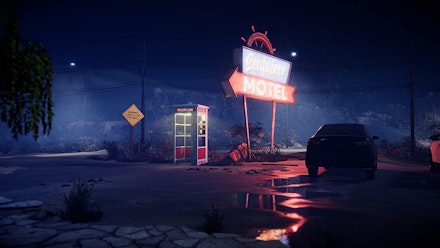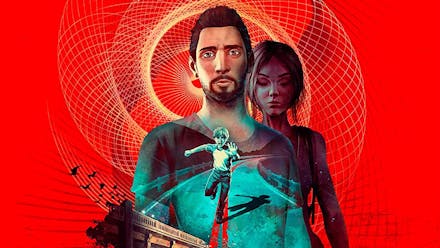Platforms: PC, PS4, PS5, Xbox One, Xbox Series X, Nintendo Switch
Let’s be up front: the title Alfred Hitchcock – Vertigo is doing some seriously heavy lifting in this adventure game from Blacksad and Yesterday developer Pendulo Studio. Fans of the movie shouldn’t expect to play through the events of Hitchcock’s (once overlooked) cinematic masterpiece, or even cross paths with the film's characters. Instead, this is more an adaptation of Hitchcock’s themes and tones – a video game based on his vibes, if you will.
Things get off to a suitably Hitchcockian start, with writer Ed Miller being pulled away from a suicidal leap from a bridge, in the wake of a car crash that killed his wife and child. Framed in dizzying angles and shots replicating Hitchcock’s tricks, and with a haunting score from composer Juan Miguel Martin, it certainly nails an appropriately unsettling tone. However, it’s in the aftermath that things become as tense and unpredictable as the inspiration material, when it appears there’s no evidence of Ed’s family ever existing.

Control then shifts between three characters as you navigate an increasingly complex series of events: Ed himself, recounting how he met his wife Faye in flashback scenes leading up to the crash; Dr Lomas, his therapist, trying to work through Ed’s convoluted story; and Officer Reyes, a police officer investigating the crash – and a murder that he suspects Ed is involved in.
What follows is a mind-bending story that tries to play with player expectations and their sense of reality. Sometimes, it even succeeds, with genuinely surprising twists along the way. Unfortunately, as a game, and an adventure game in particular, it commits the ultimate sin: despite the veneer of agency and choice throughout the game, what the player does never really matters.
Practically every choice or action throughout the game is meaningless
There’s a telling moment early on, with Ed standing on the precipice of the aforementioned bridge, and the player given the option to let him live or die. Whatever the choice, he’s pulled back from the edge by a passing trucker. Similarly, Quick Time Events – and there are many throughout the game, even for activities as banal as pouring a bowl of cat food – are just as pointless, with any failure having few to no repercussions. Even dialogue options are weightless – you may get a different response depending on your conversational selections, but it never alters the outcome of a scene or branches the story. Practically every choice or action throughout the game is meaningless, Vertigo barrelling along its own linear story towards a singular ending with no real deviation along the way.

While the tale this alternate universe Vertigo weaves is ultimately compelling – if, it should be noted for sensitive audiences, extremely dark in places, with multiple suicidal moments, sexual assaults, and even child murder – it all unfortunately hinges on some truly unlikeable characters. Ed himself is by far the worst, with practically every line meant to be charmingly wry, but instead landing as snarky, sarcastic, or just plain mean. It’s rarely an issue of which dialogue option is chosen either – his first meeting with Faye, who mysteriously arrives at his remote cabin after injuring her foot on a hike, gives a choice of responses ranging from blunt disinterest to an awkward “we’ll have to amputate” joke. It’s perhaps meant to be flirtatious but comes across as weaponised cringe. Even worse, spoken dialogue frequently doesn't match speech animation, which constantly ruins whatever mood a scene may be building. It’s all a very far cry from Alec Coppell and Samuel Taylor’s script for the cinematic Vertigo.
Mechanically, too, Vertigo disappoints. Puzzles – usually a key aspect of adventure games – are incredibly basic, usually amounting to little more than picking up an obvious item to move a scene along, while the QTEs, beyond being devoid of consequence, are rarely even challenging either. The one glimmer of interest is in the Dr Lomas sections, where she tries to reconstruct Ed’s memories through hypnotherapy sessions, scrubbing through his recollections like a film editor to determine the truth of his history. It’s the one area of Vertigo that really feels particularly game-like, instead of a vaguely interactive movie.
That’s ultimately Vertigo the game’s biggest problem – exploring Hitchcock’s themes, either those of his broad oeuvre or of Vertigo the film in particular, does have merit. Examining the idea of memory – how our own recollections can be unreliable, and how trauma can impact that recall – in an interactive medium like games could provide some fascinating and thought provoking experiences for players. Instead, the result is an almost monomaniacal pursuit of a preconceived story that the player has no agency over. A missed opportunity.
